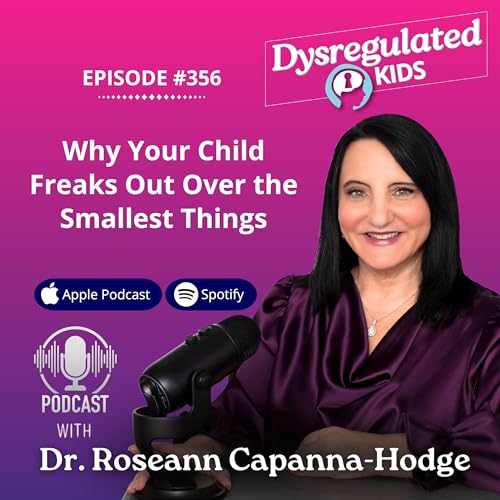
356: Why Your Child Freaks Out Over the Smallest Things
Failed to add items
Add to basket failed.
Add to Wish List failed.
Remove from Wish List failed.
Follow podcast failed
Unfollow podcast failed
-
Narrated by:
-
By:
About this listen
Parenting a child who melts down over socks that “feel weird” or a sandwich cut the “wrong” way can leave you wondering what’s really going on. You try to stay calm, but inside you’re thinking, Seriously? This can’t be about the sandwich.
You’re not alone—and you’re not a bad parent. The truth is, those small moments aren’t small at all when your child’s stress cup is overflowing.
Let me break down why your child freaks out over the smallest things and how to calm the brain first so everyone can find peace again. You’ll learn how to spot the warning signs of a full stress cup, what’s happening in your child’s brain during a meltdown, and simple ways to help them regulate—without power struggles or guilt.
Why Does My Child Melt Down After School?
Ever notice how your child holds it together all day at school—only to fall apart the second they walk in the door? That’s the stress cup effect.
Every challenge, noise, and demand throughout the day adds a “drop” to your child’s nervous system. By the time they get home, that cup is full, and even seemingly small things push them over the edge.
Here’s what fills your child’s stress cup:
- Classroom stress and transitions
- Sensory overload (sounds, textures, smells)
- Hunger and fatigue
- Social struggles with other kids
- High expectations or perfectionism
When the brain is overstressed, logic and problem-solving shut down, and big emotions take over. That’s why reasoning in the heat of the moment rarely works—you’re talking to a brain that’s gone offline.
Try this:
- Pause before reacting. Your calm becomes their calm.
- Offer a short regulation break (quiet time, water, movement) before talking.
- Create predictability. Use gentle countdowns and routines to lower stress.
Why Do Simple Things Feel Like a Big Deal?
When your child cries or screams over “nothing,” it’s not manipulation—it’s dysregulation. The meltdown isn’t about the apple slices or the wrong color cup; it’s about a nervous system that can’t take one more drop.
Here’s what’s really happening:
- The amygdala (the brain’s alarm system) hijacks control.
- The prefrontal cortex—the part that helps kids think and reason—goes offline.
- Small frustrations suddenly feel enormous.
So when your child says they “hate” their shirt or “can’t handle” their homework, it’s a cry for help, not defiance.
What helps instead:
- Co-regulate first. Anchor your own emotions before helping your child.
- Name what’s happening. “It sounds like you’ve had a really hard day.”
- Micro resets. Stretch, take a breath, sip water—each helps pour stress out of the cup.
If you’re tired of walking on eggshells or feeling like nothing works…
Get the FREE Regulation Rescue Kit and finally learn what to say and do in the heat of the moment.
Become a Dysregulation Insider VIP at www.drroseann.com/newsletter and take the first step to a calmer home.
How Can I Help My Child Cope With Big Emotions?
For



